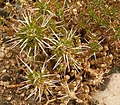Maihuenia patagonica
| Maihuenia patagonica | |
|---|---|

| |
| Scientific classification | |
| Kingdom: | Plantae |
| Clade: | Tracheophytes |
| Clade: | Angiosperms |
| Clade: | Eudicots |
| Order: | Caryophyllales |
| Family: | Cactaceae |
| Genus: | Maihuenia |
| Species: | M. patagonica
|
| Binomial name | |
| Maihuenia patagonica Phil. Britton & Rose
| |
| Synonyms[2] | |
| |
Maihuenia patagonica, commonly known locally as chupasangre or siempre verde, is a succulent cactus shrub native to Chile and Argentina. Maihuenia patagonica is remarkably tolerant to moisture and cold temperatures.[3]
Description
[edit]Maihuenia patagonica forms dense cushions about 30–40 cm (12–16 in) tall and 3 meters in diameter with densely-packed spines. It has a single, 40 cm (16 in) long taproot. The elongated shoots are not segmented and are loosely arranged. They are up to 40 centimeters long and have a diameter of 1 to 2 centimeters. There are numerous button-like to cylindrical, spur-like short shoots. The numerous green leaves are conical, ovoid or linear and circular to elliptical in cross section. They are 2 to 6 millimeters long and 1.5 to 3 millimeters in diameter. The single, stiff central spine is 3 to 7.5 centimeters long. The 2 marginal thorns (rarely only one or completely missing) are sometimes inconspicuous, sometimes lie on the surface of the shoot and are 2 to 8 millimeters long.
It blooms white to violet flowers usually appear terminally on short shoots. The elongated to almost spherical to club-shaped fruits are 2 to 4 centimeters long.[4]
The chromosome count is 2n = 22[5]
-
Plants
-
white flowers
Distribution
[edit]Maihuenia patagonica is widespread in southern Argentina and Chile at altitudes of up to 500 meters.
Taxonomy
[edit]The first description as Opuntia patagonica was published in 1863 by Rudolph Amandus Philippi. The specific epithet patagonica refers to the occurrence of the species in Patagonia.[6] Spanish common names are “Chupa Sangre”, “Siempre Verde”, and “Yerba del Guanaco”. Nathaniel Lord Britton and Joseph Nelson Rose placed it in the genus Maihuenia in 1919.[7]
References
[edit]- ^ The IUCN Red List of Threatened Species (2017). "Maihuenia patagonica". IUCN Red List of Threatened Species. 2017: e.T152787A121548884. doi:10.2305/IUCN.UK.2017-3.RLTS.T152787A121548884.en. Retrieved 12 February 2022.
- ^ The Cactus Expert. "Maihuenia patagonica".
- ^ "Maihuenia patagonica". Retrieved 13 February 2022.
- ^ Anderson, Edward F.; Eggli, Urs (2005). Das grosse Kakteen-Lexikon (in German). Stuttgart (Hohenheim): Ulmer. pp. 360–361. ISBN 3-8001-4573-1.
- ^ "Tropicos". Tropicos. Retrieved 2023-10-21.
- ^ Chile., Universidad de (1863). "Anales de la Universidad de Chile". Biodiversity Heritage Library. ISSN 0365-7779. Retrieved 2023-10-21.
- ^ Britton, Nathaniel Lord; Eaton, Mary E.; Rose, J. N.; Wood, Helen Adelaide (1919). The Cactaceae : descriptions and illustrations of plants of the cactus family. Washington: Carnegie Institution of Washington. doi:10.5962/bhl.title.46288.
External links
[edit] Data related to Maihuenia patagonica at Wikispecies
Data related to Maihuenia patagonica at Wikispecies Media related to Maihuenia patagonica at Wikimedia Commons
Media related to Maihuenia patagonica at Wikimedia Commons



